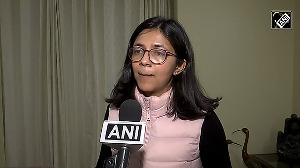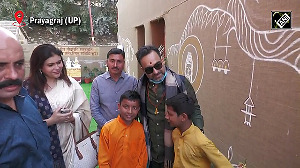Pakistan is anxiously watching Prime Minister Manmohan Singh's visit to Afghanistan on August 28 and 29. Congress member of Parliament Rahul Gandhi will accompany Dr Singh.
The issue of security is likely to dominate his visit to Kabul. There are many reasons for the security issue getting prominence.
Dr Singh is visiting Kabul at a crucial time when the election of Afghan Parliament is going to be held in September and at the same time, violence is on the rise causing a challenge to Hamid Karzai's government.
Afghan President Karzai is worried about his country's security in view of the recent terrorist attacks carried out from Pakistan side of its border.
In this year alone, more than 700 Afghan troops have died fighting the terrorists.
Around 45 United States troops have died. The US has been occupying the country after 9/11 when after a high-tech and one-sided war threw out the fundamentalist Taliban government.
But now, there are firm signs of resurgence of the Taliban. In May 2004, Taliban terrorists had shot down 17 US troops. The incident had shocked the US because this was the highest casualty of US troops in the terrorists' attacks in Afghanistan after 9/11.
Karzai himself is under security threat and is still not having much influence outside Kabul making the security situation more difficult.
Dr Singh was expected to visit Jalalabad, but in view of fragile security situation over there, his visit has been cancelled.
Now, Dr Singh's two-day visit will be restricted to Kabul alone.
Karzai is blaming Pakistan for increasing violence in his country. India's Foreign Secretary Shyam Saran said on Friday in a press conference, "Some of the recent occurences which have taken place where there have been some cross-border incidents, insiders coming in from the Pakistani side and indulging in violent acts in Afghanistan, are something that we have condemned. We have offered our full support to Afghanistan in dealing with this newly emerging threat to their political stability."
Saran was rather categorical in India's commitment to improve security of Afghanistan. He said, "I would like to also draw attention to the fact that we have time and again stated that the stability of Afghanistan and its economic recovery continues to be hampered by the activities of the remnants of the Taliban. You would have frequently heard us saying that we do not believe that there is a good Taliban or a bad Taliban. We believe that these elements have to be kept under control." India's stand makes Pakistan anxious.
Also, the powerful and combative Pashtun population resides on both sides of the Afghanistan's eastern border against whom it's not easy to take stern action to stop violence. Taliban is a largely Pashtun organisation.
Professor Sreedhar, Afghanistan expert, said, "US and Pakistan relationship is having its own dynamics, which is imposing limitations on Karzai government to improve security situation."
Since many years, India and Pakistan divide is seen on soil of Afghanistan also. When Russia had invaded Afghanistan India sided with the Northern Alliance while Pakistan sided with Mujahideens who were fighting a religious war.
Since then, Pakistan abhors India's closeness with Afghan leaders and is now wary of India's increasing economic contribution and collaboration with Afghans.
Saran has already mentioned about the difficulty that Indians have in reaching assistance to Afghanistan because India has to take a circuitous route through Iran to get to Afghanistan. Pakistan has steadfastly refused a transit route through its territory.
Karzai has alleged that terrorism is being exported from Pakistan side. The allegation has been denied by Pakistan army.
When terrorists attacked US troops, Pakistan army blamed it on Islamic fundamentalists in Pakistan.
But, Pakistan army's allegations have been forcefully denied by radical religious leaders of Pakistan.
Maulana Fazlur Rehman has rather, openly, in a press meet, blamed President Pervez Musharraf's army for instigating Taliban to infiltrate Afghanistan borders and attack the US army in Afghanistan.
During Dr Singh's recent US visit, India and US has agreed to "work together to strengthen democratic practices and capacities".
Afghanistan is surely one country on the minds of US and India where positive co-operation is possible because India knows current Afghan leaders well, already has more than $ 500 million worth of projects going and importantly, from the Iran side into Afghanistan, India is building strategically important roads to reach out to the Central Asian countries where there is a huge possibility for consumer goods trade.
For India, the visit has a special significance also because this is the first visit at the prime minister level taking place after 29 years of Indira Gandhi's visit.
India is involved in many projects in areas of health and education. Now, India has agreed to build the new Parliament House in Kabul.
On Monday morning, in Dr Singh's gracious presence, the laying of the foundation stone of the Parliament building will take place by Baba-e-Millat, that is, His Majesty Zahir Shah.
Dr Singh will reach Kabul on Sunday by 9.30 am local time.
He will be given a ceremonial welcome. Then, both leaders will have one-to-one talks as well as delegation-level talks.
Memorandum of understandings on various issues will be signed. Some new development projects will be announced by Dr Singh.
Later, both leaders will address the press conference. Lunch is a personal one to be given by the president to Dr Singh and his wife Gursharan Kaur.
Habibia school, the biggest school of Kabul, which has been renovated with Indian assistance, will be handed over by Dr Singh at 4 pm on Sunday.
Later, he will attend a function of Aga Khan Foundation. He will also be laying the foundation stone for the new Chancery building for the Indian Embassy in Kabul. There will be a visit to the Mazar of Babur, which lies just on the outskirts of Kabul. Many hope that it should not create a new controversy back home.
On Sunday, Dr Singh's last engagement is the banquet dinner hosted by President Karzai.
On Monday, in addition to the laying of the foundation stone of the Parliament building, Dr Singh will meet non-resident Indians and after lunch, will return to New Delhi around 5 pm.
Dr Singh, who was born in Gah in West Punjab in Pakistan, has fond memories of Afghanistan because his father Gurmukh Singh had trading links with Afghanistan. He told the media on Saturday, "I am personally looking forward to the visit."
When asked lightly, "Will you be bringing asafoetida powder (used in Indian cooking and known to be of high quality in Afghanistan) from Kabul?"
He shyly said, "Where is the time?"






 © 2025
© 2025